“You Only Live Twice” is the name of the fifth James Bond film, as well as the title of its theme song, performed by Nancy Sinatra. The film and soundtrack were both released in the summer of 1967. More on the music in a moment; first, some background.
When James Bond creator and author, Ian Fleming, roamed the world writing early travel stories, he had visited Japan and was very impressed by Japanese culture. Fleming later decided to bring British secret agent 007 to this location via his Bond novels. You Only Live Twice, published in 1964, picked up where a previous Bond adventure and Fleming novel, On Her Majesty’s Secret Service, had left off. The film’s actual plot for You Only Live Twice, however, is a good bit different than Fleming’s novel of that name, his 11th and the last one he wrote for the James Bond series. But the film is flavored throughout with Japanese culture, Japanese scenery, and a quite pleasant and intriguing Japanese musical motif.
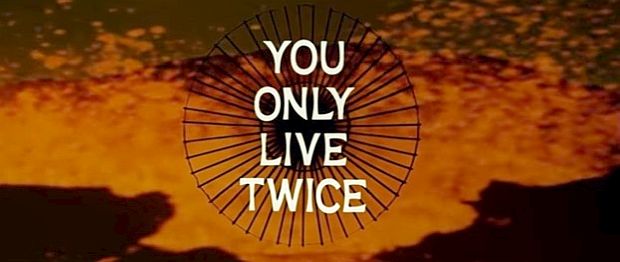
One of the opening title screens for the 1967 James Bond film, “You Only Live Twice,” during which the Nancy Sinatra title song is played over the opening credits and film’s set up.
In the film, British secret agent, James Bond, after a faked death, is dispatched to Japan after a manned American spacecraft disappears mysteriously while in orbit (swallowed whole and captured by a SPECTRE spacecraft, but then unknown to authorities). Back on earth, amid the Cold War, the U.S. blames the Soviet Union for the missing spacecraft. And later in the film, one of Russia’s orbiting spacecrafts is hijacked as well. Meanwhile, a British tracking station in Asia has recorded an alien craft landing in the Sea of Japan and suspects Japanese involvement somehow. This is when Bond, traveling under an alias after his faked death, is sent secretly to Japan, where he later poses as a fisherman in a local Japanese village to investigate the suspected hijackers’ base of operations.
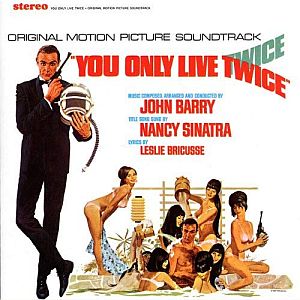
1967. Original soundtrack album for “You Only Live Twice,” the 5th James Bond film, featuring popular title theme song of that name by Nancy Sinatra. Click for CD or digital singles.
Music Player
“You Only Live Twice”
Nancy Sinatra, 1967
(scroll down for lyrics)
The title song, offered above, is widely recognized for its striking opening bars and Japanese flavor. It is heard twice in the film: at the opening and also over the closing credits.
In 2008, Drew Kerr, at an online music site, rated all of the Bond theme songs and placed Nancy Sinatra’s “You Only Live Twice” at No. 1. At the time, Kerr told National Public Radio that Sinatra’s song fit all the usual Bond criteria, from seductive to “spy-ish” sounding, but went further. “It also had that existential thing a lot of Bond movies had,” he said. “There’s something very emotional and cutting about that song.” More recently, in 2015, David Ehrlich at Rolling Stone rated all 22 Bond theme songs, ranking “You Only Live Twice” at No. 3, calling it “a classic” – ahead of Adele’s “Skyfall” of 2012 (No. 4) but behind Shirley Bassey’s 1963 hit, “Goldfinger” (No.1), and Paul McCartney & Wings’ 1973 song, “Live and Let Die” (No.2).
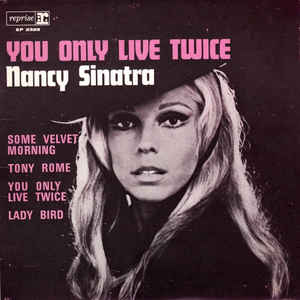
Nancy Sinatra on a later Reprise label EP featuring “Your Only Live Twice” and other songs. Click for similar CD.
For the 1967 Bond film, however, Nancy Sinatra was the first non-British vocalist to sing a theme song for the James Bond film series. The music, as with other scores for Bond films of that era, was composed by John Barry. The song’s lyrics were written by Leslie Bricusse.
Both the Sinatra theme song, and full soundtrack album, scored well on the music charts of that day. The soundtrack for “You Only Live Twice” rose to No. 27 on the Billboard 200 album chart in 1967.
Two versions of the Sinatra title song were recorded – one with the full orchestra for the soundtrack, and a second one with guitar backing more appropriate for release as a single. Both versions were popular – the soundtrack version on radio, and the single version for the pop charts, the latter rising to No. 44 on the U.S. Billboard chart and No. 11 in the UK.
Popular Appeal
Among the numerous James Bond film songs, “You Only Live Twice” is one that has had lasting appeal for many listeners. It offers something of a poignant and longing message for some; and perhaps a bit of life nostalgia – of memories gone by – for others.
The suggestion of two lives in the song, of course, raises all kinds of interesting possibilities, though here the premise seems to be the struggle between a real world and a dream world – “one life for yourself, and one for your dreams.”
|
“You Only Live Twice” You only live twice, or so it seems You drift through the years and life seems tame And love is a stranger who’ll beckon you on This dream is for you, so pay the price And love is a stranger who’ll beckon you on This dream is for you, so pay the price Songwriters: John Barry / Leslie Bricusse |
This notion is tailor made for spycraft, certainly, and works well with the James Bond mission in this particular film. But the idea can also inhabit mere mortals as well, and so, the song’s appeal to just ordinary folks.
Also woven through the song is the love variable; that elusive, sometimes mysterious element that is also a part of this song’s suggestion.
The lyrics speak of love as a beckoning stranger – an opportunity, though vanishing the moment second thoughts creep in, or worries about what may lay ahead. “Don’t think of the danger, or the stranger is gone,” say the lyrics. In other words, just go for it, or you’ll lose it!
You can have the dream, suggest the lyrics, if you’re prepared to risk the unknown and reap the consequences, whether good or bad. So, just jump in, “you only live twice.”
Along these lines, Mark Monahan of The Daily Telegraph of London described the lyrics as “mysterious, romantically carpe diem … at once velvety, brittle and quite bewitching.”
For various listeners, the song’s lyrics may summon personal past experiences of missed opportunities, ranging from that mysterious someone who got away, to missed love affairs, missed career opportunities, and generally, the lost past of days gone by. Others have been moved by the music. Visitors to YouTube.com videos playing music from You Only Live Twice have noted various reactions and comment on the film’s soundtrack or the Nancy Sinatra song. Stephen Paul Neave called the film’s music “hauntingly beautiful,” a sentiment repeated by other listeners. Oor Jaki, another from YouTube, said the song “sends shivers down my spine. John Barry really knew how to get right under your skin.” Bruce Powell, liking Nancy’s performance of the song, offered: “…It has some kind of magical, mystical quality, and some eternal truths in the lyrics. Wonderful piece.” Walter Fechter noted Nancy’s “sublime voice” and the “superb orchestration,” and that the song had remained fixed in his memory since 1967.
Japanese Sound
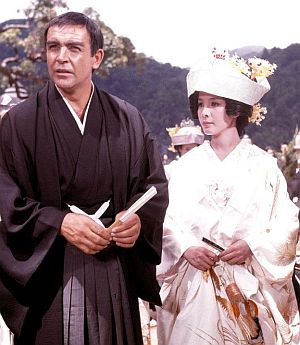
James Bond, in staged marriage ceremony to Kissy Suzuki in Japanese fishing village, as part of his cover. Click for song.
Music Player
“Mountains & Sunsets”
“You Only Live Twice” Soundtrack
Also on the soundtrack, there are short, repeating, instrumental motifs of the theme song that occur throughout the film during several scenes, including the beautifully-scored wedding scene when Bond, as part of his cover, marries a local Japanese fisherwoman (“ama” pearl diver), Kissy Suzuki, played by Japanese actress Mie Hama.
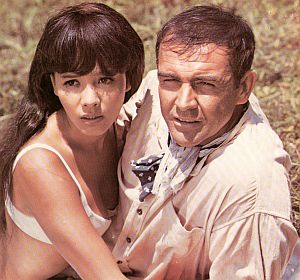
Kissy Suzuki and James Bond cavorting on Japanese hillside as they discover helicopters flying into an extinct volcano.
Music Player
“The Wedding”
“You Only Live Twice” Soundtrack
In the film plot, meanwhile, Bond is working with Japanese intelligence commander and ally “Tiger” Tanaka.
Tanaka has helped set up Bond in the fishing village, and earlier, as a measure of his Japanese hospitality, treated Bond to an evening with Gisha girls at a Japanese bath house. Tanaka has also been tracking parties believed related to the space hijackers and had Bond undergo rigorous training with Tanaka’s ninja force for an expected confrontation with the hijackers.
Bond later, with his new Japanese wife on one of their rural outings, discovers that the hijackers are using an extinct volcano in the Japanese hills to house an elaborate underground complex where they are holding American and Russian astronauts and spacecraft, as well readying their launch site at the complex for another space nabbing of a soon-to-be-launched U.S. spacecraft.
Bond v. Spectre
During some later reconnaissance of a supporting SPECTRE ship docking at nearby islands, Bond has the opportunity to use one of MI-5’s new high-tech military toys, “Little Nellie,” a jazzed-up mini-helicopter that can nearly single-handedly defeat any enemy, and in this case, with Bond at the controls, downs four SPECTRE craft that have come after him.

SPECTRE’s fake-volcano missile site, where Bond and his ninja allies later create havoc, leading to its complete destruction and the release of the captured astronauts.
Bond later infiltrates the SPECTRE base inside the extinct volcano, and a major battle ensues. To make a long story short, Bond, with later help of the ninjas, does battle with the bad guys at this location and saves the day, freeing the prisoners and preventing any further space thievery by SPECTRE. A self-destruct device is activated by arch nemesis and rival, Ernst Bloefeld, who has escaped, and the whole complex blows up. Bond and his ninja allies, meanwhile, have accomplished their mission, avert World War III, and also escape to the sea. As the film ends, Bond rejoins Kissy in a life raft, hoping to convince her they should begin their “honeymoon.” But then a British sub beneath them surfaces, catching the raft on the sub’s deck, as Bond is then summoned to make his report.
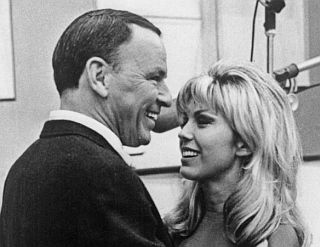
1967. Frank Sinatra with daughter Nancy in recording studio.
Initially, in the making of the film’s title song, “You Only Live Twice,” there was some trial and error before Nancy Sinatra became the choice to sing that track.
The song was first recorded by Julie Rogers, a popular British singer. Rogers recorded her version with an orchestra in London. And jazz singer Lorraine Chandler also recorded a version that was more in the bombastic mold of Shirley Bassey, the Welsh singer famous for other Bond themes, notably Goldfinger.
But for this Bond film, there was some debate over which version and which artist should be used. As John Barry would put it: “It was usually the producers that said ‘this isn’t working, there’s a certain something that it needed’. If that energy wasn’t there, if that mysterioso kind of thing wasn’t there, then it wasn’t going to work for the movie.”
Actually, the film’s producer, Cubby Broccoli, wanted his friend, Frank Sinatra, to perform the song. But Sinatra suggested his daughter, Nancy, instead. John Barry at one point had thought to have Aretha Franklin do the song, but the producers insisted that he use Nancy, as she was then enjoying great popularity in the wake of her hit single, “These Boots Are Made for Walkin’.”
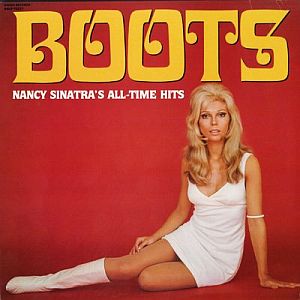
A later album of Nancy Sinatra hits, with Nancy attired in mini-skirted dress and boots. Click for vinyl.
“Nancy Sinatra was the epitome of that swinging sixties hipness, with her boots, her mini skirts, and her blonde hair,” observed British songwriter Marc Almond, commenting some years later on her choice for the song. “She was American as well, which I think was important because that gave the feeling that Bond was international. But there was also a sophistication to her as well.”
Nancy, for her part, later recalled that she was quite nervous during the recording. She was 26 years old at the time. She said she was “scared to death.”
The song was recorded with a 60-piece orchestra in May 1967 at the CTS Studios in London. John Barry created the final version from editing and mixing music and vocals of some previous 30 takes, and re-orchestrating the song to suit Nancy’s range. And Nancy herself later explained: “‘You Only Live Twice’ was difficult in a lot of ways. The fact that is was quite rangey, and I wasn’t used to that, I was used to my little octave and a half. I even asked John [Barry], are you sure you want me to do this because maybe you need Shirley Bassey? But they said no, we want you, we want your sound.”

Penguin Books cover art for hardback edition of Ian Fleming’s “You Only Live Twice.” Click for copy.
For additional stories at this website on film and film music, see for example: “Goldfinger,” another Bond film with Shirley Bassey singing the classic title song; “Philadelphia Morning,” which explores some well-done, film-enhancing music by Bill Conti in the first Rocky film; “Let The River Run,” a story on the rousing Carly Simon song used in the 1988 film Working Girl; “Streets of Philadelphia,” covering two moving songs – one by Bruce Springsteen and the other by Neil Young – that underscore the message and emotional power of that classic film about an AIDS-stricken lawyer played by Tom Hanks; and “The Saddest Song,” which covers some of the history of Samuel Barber’s 1939 masterwork, “Adagio for Strings,” and its use in films including “Platoon” and “Elephant Man.”
Additionally, the “Sinatra Stories” page offers a selection of stories involving the music, politics, and/or love life of Frank Sinatra.
Thanks for visiting – and if you like what you find here, please make a donation to help support the research and writing at this website. Thank you. – Jack Doyle
|
Please Support Thank You |
____________________________________
Date Posted: 4 August 2019
Last Update: 30 July 2023
Comments to: jdoyle@pophistorydig.com
Article Citation:
Jack Doyle, “You Only Live Twice, Film Music: 1967,”
PopHistoryDig.com, August 4, 2019.
____________________________________
Sources, Links & Additional Information

Ian Fleming's 1964 book, "You Only Live Twice," showing cover of New American Library 1st edition. Click for copy.
“Nancy Meets James Bond … in the Recording Studio,” Melody Maker (London), May 13, 1967.
Andrew, “Nancy Meets James Bond: ‘You Only Live Twice’ at 50,” NancySinatra.com, April 28th, 2017.
“Ranking The Bond Theme Songs,” NPR/All Things Considered, November 14, 2008.
David Ehrlich, “James Bond Movie Theme Songs, Ranked Worst to Best,” RollingStone.com, November 2, 2015.
Keith Caulfield, “’Skyfall’ Soundtrack: Highest-Charting Bond Album in 27 Years,” Billboard .com, November 16, 2012.
MI-6 Staff, “You Only Sing Twice: The History of the Haunting Title Song That Was Recorded 50 Years Ago,” www.MI6-hq.com, May 5, 2017.
Nancy Sinatra – You Only Live Twice (HQ),” YouTube.com, posted, December 22, 2011 (includes Nancy Sinatra song and film frames for opening and closing credits with music, 4:27).
“You Only Live Twice (film),” Wikipedia.org.
“You Only Live Twice (song),” Wikipedia.org.
“You Only Live Twice (soundtrack),” Wikipedia .org.
__________________________________________________